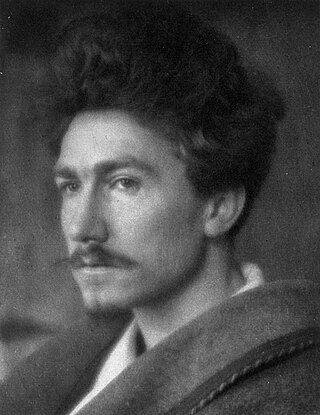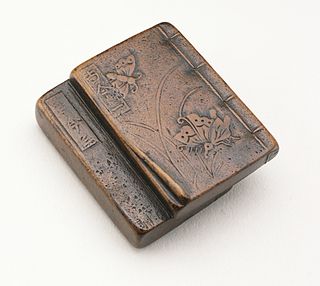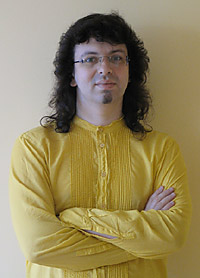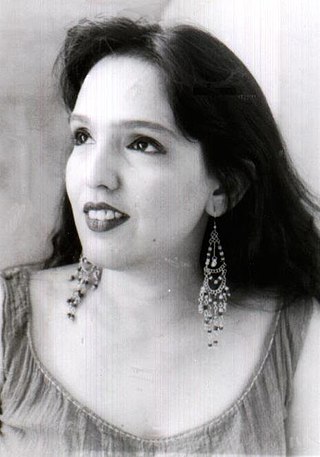
Haiku is a type of short form poetry originally from Japan. Traditional Japanese haiku consist of three phrases composed of 17 phonetic units in a 5, 7, 5 pattern; that include a kireji, or "cutting word"; and a kigo, or seasonal reference. Similar poems that do not adhere to these rules are generally classified as senryū.

Imagism was a movement in early-20th-century Anglo-American poetry that favored precision of imagery and clear, sharp language. It is considered to be the first organized modernist literary movement in the English language. Imagism is sometimes viewed as "a succession of creative moments" rather than a continuous or sustained period of development. The French academic René Taupin remarked that "it is more accurate to consider Imagism not as a doctrine, nor even as a poetic school, but as the association of a few poets who were for a certain time in agreement on a small number of important principles".
Prose poetry is poetry written in prose form instead of verse form, while preserving poetic qualities such as heightened imagery, parataxis, and emotional effects.

American poetry refers to the poetry of the United States. It arose first as efforts by American colonists to add their voices to English poetry in the 17th century, well before the constitutional unification of the Thirteen Colonies. Most of the early colonists' work was similar to contemporary English models of poetic form, diction, and theme. However, in the 19th century, an American idiom began to emerge. By the later part of that century, poets like Walt Whitman were winning an enthusiastic audience abroad and had joined the English-language avant-garde.

Japanese poetry is poetry typical of Japan, or written, spoken, or chanted in the Japanese language, which includes Old Japanese, Early Middle Japanese, Late Middle Japanese, and Modern Japanese, as well as poetry in Japan which was written in the Chinese language or ryūka from the Okinawa Islands: it is possible to make a more accurate distinction between Japanese poetry written in Japan or by Japanese people in other languages versus that written in the Japanese language by speaking of Japanese-language poetry. Much of the literary record of Japanese poetry begins when Japanese poets encountered Chinese poetry during the Tang dynasty. Under the influence of the Chinese poets of this era Japanese began to compose poetry in Chinese kanshi); and, as part of this tradition, poetry in Japan tended to be intimately associated with pictorial painting, partly because of the influence of Chinese arts, and the tradition of the use of ink and brush for both writing and drawing. It took several hundred years to digest the foreign impact and make it an integral part of Japanese culture and to merge this kanshi poetry into a Japanese language literary tradition, and then later to develop the diversity of unique poetic forms of native poetry, such as waka, haikai, and other more Japanese poetic specialties. For example, in the Tale of Genji both kanshi and waka are frequently mentioned. The history of Japanese poetry goes from an early semi-historical/mythological phase, through the early Old Japanese literature inclusions, just before the Nara period, the Nara period itself, the Heian period, the Kamakura period, and so on, up through the poetically important Edo period and modern times; however, the history of poetry often is different from socio-political history.
Haibun is a prosimetric literary form originating in Japan, combining prose and haiku. The range of haibun is broad and frequently includes autobiography, diary, essay, prose poem, short story and travel journal.
Makoto Ueda was a professor emeritus of Japanese literature at Stanford University.

Dmitry Vladimirovich Kuzmin, is a Russian poet, critic, and publisher.
Nationality words link to articles with information on the nation's poetry or literature.

Nigel Jenkins was an Anglo-Welsh poet. He was an editor, journalist, psychogeographer, broadcaster and writer of creative non-fiction, as well as being a lecturer at Swansea University and director of the creative writing programme there.
Mark Pawlak is a Polish-American poet and educator.

Lenard Duane Moore in Jacksonville, North Carolina. He is a writer of more than 20 forms of poetry, drama, essays, and literary criticism, and has been writing and publishing haiku for more than 20 years.

Ștefan Aurel Baciu was a Romanian and Brazilian poet, novelist, publicist and academic who lived his later life in Hawaii. A precocious, award-winning, young author in interwar Romania, he was involved in editing several literary magazines. Attracted into left-wing democratic politics and the Social Democratic Party (PSDR), he camouflaged his views while working for the fascist press under dictatorial regimes, but returned in 1944 to manage the PSDR's Libertatea newspaper. Witnessing first-hand the gradual communist takeover, Baciu managed to have himself assigned to a diplomatic posting in Switzerland, and ultimately defected in 1948. A resident and then citizen of Brazil, and a traveler throughout Latin America, he wrote works in Portuguese, Spanish, English and German, as well as in his native Romanian.
Wally Swist is an American poet and writer. He is best known for his poems about nature and spirituality.
Rei Berroa is a Dominican-American poet, university professor, literary and cultural critic, and translator living in the United States. He has published more than 25 books of poetry, anthologies, translations, and literary criticism.

David Ramón Sánchez Palomares was a Venezuelan poet, born in Escuque. In 1975 received the National Prize for Literature; in 2006 the first Víctor Valera Mora International Prize for Poetry; and in 2010 the Ibero-America Award for Literature.

Wilberth Alejandro Rejon Huchin is a Mexican poet and cultural manager. He was a fellow at the 2016 interface cultural festival in Mérida. Director of the Tecoh international poetry festival, Yucatán. Some of his texts have been translated into Arabic, Italian and Romanian.

Wafi Salih is a Venezuelan-born writer of Lebanese descent. Writer of: poetry, short stories, essays, dramaturgy and film scripts. She is recognized as “the master of short poetry in Venezuela” for her extensive exploration of haiku poetry, a literary genre of Japanese origin. Her books has been translated into English, Arabic, French, Italian, Portuguese and Polish.










